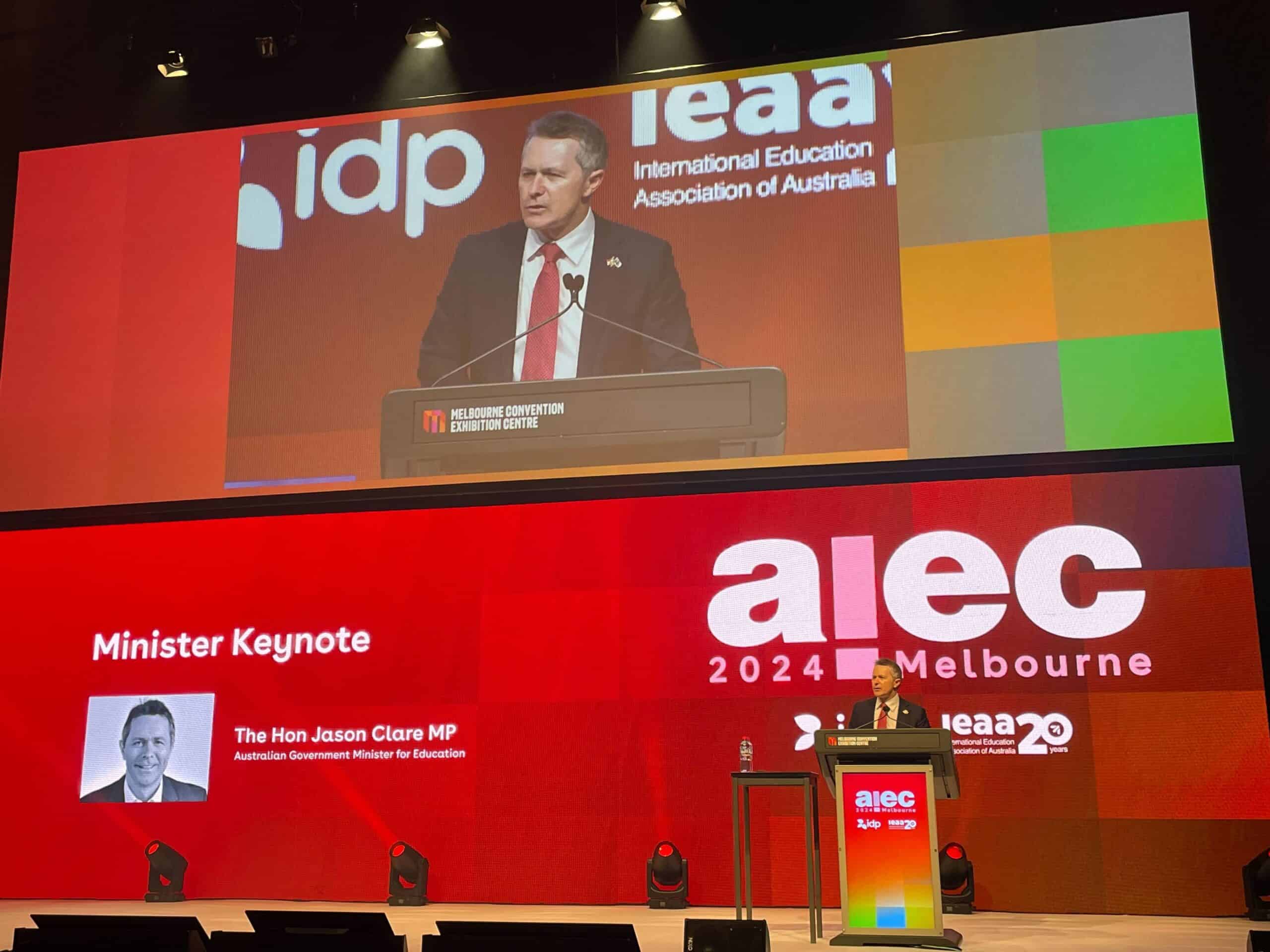Speaking to a packed out room at the Australian International Education Conference, Clare spoke of the value of international education, before moving on to the rationale for the government’s proposed cap on international students numbers which has dominated headlines since May.
“International education is a critical, national asset,” said Clare while speaking at the annual conference co-hosted by IDP and IEAA.
“It’s not just about money, it makes us friends, when students come to Australia and when they go home, they take that love for us back with them. In the world we live in, at the time we live in, we can’t put a price on that.”
“Reform is needed for the sector but certainty is needed too,” he continued.
Clare referenced the government’s ambitions to get immigration levels back to pre-pandemic levels, including international student numbers.
According to Clare, it has been institutions most negatively impacted by ministerial direction 107 that have asked government to intervene, leading to the announcement of the National Planning Level.
With the introduction of caps, Clare promises to ditch ministerial direction 107 which he describes as a “pretty blunt object”, noting that it has advantaged some, while hurting others.
“And so I’ve acted and introduced the bill with integrity measures,” said Clare of the ESOS Amendment Bill, set to shake-up Australia’s international education landscape from its mooted January 1 2025 implementation date.
Although the impact is already being seen by some institutions, despite the bill yet to be debated by Senate, following a recent Senate Committee report which largely supported its passage.
Clare commented: “Not everyone is happy with it but it is a heck of a lot better than ministerial direction 107. It’s a base to build on.
“The Bill has been in parliament for 160 days. It’s time to pass the bill and get rid of ministerial direction 107.”
It’s time to pass the bill and get rid of ministerial direction 107
Jason Clare, Australian education minister
Not everyone gathered at the Melbourne conference is convinced. One stakeholder to criticise Clare’s address is Ian Aird, CEO of English Australia, who described the remarks as “staggering”.
Aird took issue with the amount of time given to the bill in the minister’s speech, despite it dominating much of the conversation elsewhere on the conference agenda and in informal discussions being had in and around the conference.
Pointing out Clare’s “false dichotomy” – the choice between a cap on international numbers or ministerial direction 107 which has plagued the sector – Aird said: “We don’t need to choose between ministerial direction 107 and this bill. Both are terrible and both deserve the garbage heap. Neither should be there at all.”
“To suggest that the only solution to ending 107 is this bill is disingenuous in the extreme,” said Aird.
“The bill and 107 are completely separate things. One is an immigration department prioritisation of what visas get processed first, and the other is a staggeringly inept piece of legislation that will cause damage across the sector.
“The caps are terrible. Do they need to be in place? Do we need a limit on enrolments? Possibly. But the way it’s being done is staggeringly bad, and it’s really down to domestic politics.”
Meanwhile, Phil Honeywood, IEAA CEO, was more lenient on Clare, pointing out the minister has “put best foot forward on behalf of the sector” when it comes to enrolment limitations and worked to ensure as many possible exemptions to the policy, including that of higher degree by research students, students studying standalone ELICOS course, and more.
Clare’s remarks were followed by those of India’s education minister, Dharmendra Pradhan, with both ministers underscoring the strong and evolving partnership between India and Australia in education.
Minister Pradhan has travelled to Australia for the second Australia-India Education and Skills Council meeting which will be held in Sydney on October 23 where the ministers are set to explore further partnerships to deliver Australia’s education offering in India, with further discussions around how to bridge skills gaps through education and training.
“It is an honour to welcome minister Pradhan back to Australia for his second visit since 2022,” said Clare.
“This is the fourth time we have caught up here or in India in the last two years. I look forward to showcasing Australia’s education system and working together to further strengthen Australia’s education links with India.”





